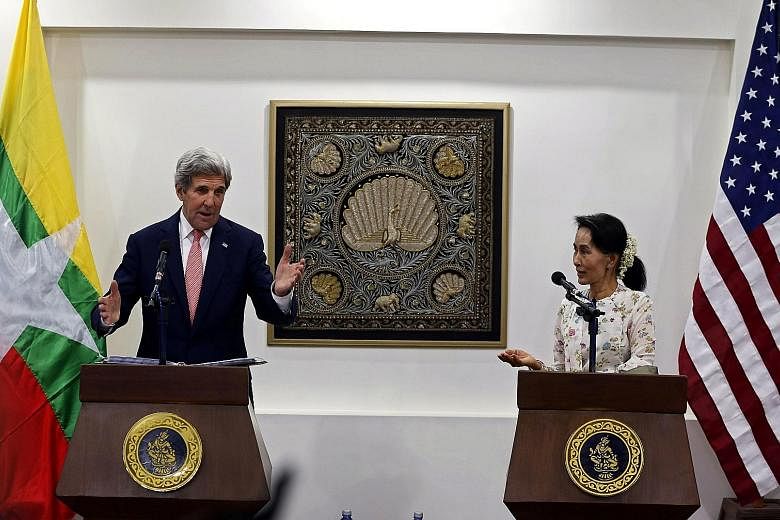NAYPYITAW (Myanmar) • US Secretary of State John Kerry yesterday hailed Myanmar's transition to a civilian government steered by Ms Aung San Suu Kyi as a "remarkable statement" that furthers the cause of global democracy.
In the first high-level meeting with Ms Suu Kyi and her administration since it took office in March, Mr Kerry told the Nobel laureate her country's evolution towards democracy after decades under the military served as a beacon of hope.
"Today my message is very, very simple: We strongly support the democratic transition that is taking place here," he told reporters at a joint press conference with Ms Suu Kyi in the capital, Naypyitaw.
Historic elections in November swept Ms Suu Kyi and her party into office and effectively ended half a century of military rule.
Mr Kerry applauded the process as a "remarkable statement to people all over the world", adding that the new government "has already accomplished extraordinary things".
But points of tension remain in the US-Myanmar relationship. Mr Kerry said he had discussed the Rohingya issue with Ms Suu Kyi during their meeting, describing it as "very sensitive" and "divisive".
"I know it arises strong passions here," Mr Kerry said. "What is critical to focus on is solving the problem... which is improving the situation on the ground, to promote development, promote respect for human rights and benefit all of those that live in Rakhine and throughout Myanmar."
In response, Ms Suu Kyi asked to be given "enough space" to address the plight of the Rohingya.
"Emotive terms make it very difficult for us to find a peaceful and sensible resolution to our problems," Ms Suu Kyi said. "All that we are asking is that people should be aware of the difficulties we are facing and to give us enough space to solve all our problems."
Last month, hundreds of demonstrators protested in front of the US embassy in Yangon in objection to the use of the term Rohingya in a statement issued by the embassy. The term is incendiary to Buddhist nationalists, who label the group "Bengalis" and view them as illegal immigrants from Bangladesh.
"What we want to do is avoid any terms that just add fuel to the fire," Ms Suu Kyi said. "I wasn't talking about one particular term, I was talking about all the terms that are incendiary and which create greater divisions in the Rakhine and, of course, elsewhere too."
Washington last week lifted a host of financial and trade embargoes, but has kept the backbone of its sanctions as well as a blacklist of cronies and businesses close to the former junta.
"I know that the legacy of more than half a century of military rule has not been completely erased," Mr Kerry said.
Ms Suu Kyi, a veteran activist whose decades-long struggle against the generals won the world's admiration, has much political capital in Washington.
She now serves as Myanmar's foreign minister, while also holding the newly created position of state counsellor, putting her at the helm of government in defiance of an army-drafted Constitution that bars her from the presidency. That role is now held by her long-time ally, Mr Htin Kyaw.
Mr Kerry also met army chief Min Aung Hlaing, as Washington looks to induce further democratisation moves.
Mr Kerry left for Vietnam yesterday to accompany US President Barack Obama to Hanoi and Ho Chi Minh City for a three-day visit likely to focus on trade, security and human rights.
AGENCE FRANCE-PRESSE, REUTERS

